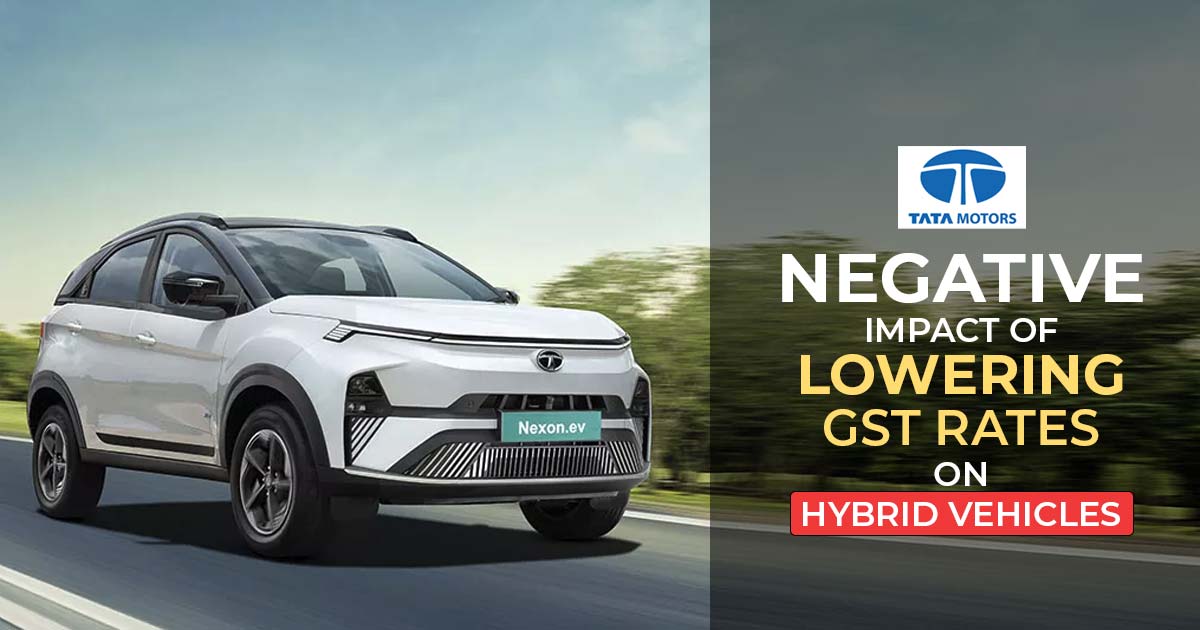
A senior official from Tata Motors, the leading manufacturer of electric vehicles in the country, cautioned on Wednesday that any effort to reduce GST tax rates on hybrid cars could lead to confusion in the industry and dilute the government’s endeavours to achieve its net-zero objectives.
Shailesh Chandra, the managing director of Tata Motors’ divisions for passenger vehicles and electric vehicles, emphasized that hybrid vehicles, which utilize a small battery pack and a motor heavily dependent on a fossil-fuel engine, essentially function as gasoline-run vehicles. He contended that hybrids do not align with the crucial goals of attaining net carbon zero, enhancing air quality, and reducing dependence on fossil fuel imports.
Read Also: 52nd Council Refuses to Lower GST on Batteries, Now EV Players Look for Policy Help
These concerns arise as the Department for Promotion of Industry and Internal Trade (DPIIT) and the Ministry of Heavy Industries are in the process of seeking consensus from the automotive industry regarding the potential rationalization of taxes on hybrid passenger vehicles.
Chandra overlooked the concept of providing incentives for hybrids, calling it a “misguided effort” by some Original Equipment Manufacturers (OEMs). He suggested that fossil fuel-based technologies, like Gasoline Direct Injection (GDI) and Compressed Natural Gas (CNG), contribute to enhancing fuel efficiency without the requirement for additional incentives, highlighting the existing benefits for hybrids in the form of a 2% lower cess on hybrid vehicles.
India levies a goods and service tax (GST) of 28% on hybrid vehicles, and 5% on EVs.
The endeavours of the Indian branches of Japanese automakers Toyota Motor Corp. and Suzuki Motor Corp., leaders in global hybrid technologies but slower in embracing fully-electric vehicle technologies, to lobby the government for a rationalization of the Goods and Services Tax (GST) on hybrid vehicles have once again divided the industry into two vocal factions. On one side are domestic manufacturers Tata Motors, Mahindra & Mahindra, and South Korean automakers Hyundai and Kia, while the other comprises Japanese automakers Toyota, Suzuki, and Honda.
Tata Motors has consistently expressed its opposition to hybrids since committing to a focus on electric vehicles (EVs). Similarly, the South Korean automaker Hyundai has signalled its reluctance to support a tax cut for hybrids.
Shailesh Chandra emphasized, “If any benefit is given to hybrid, it will just confuse the entire investment profile of all OEMs, it will be a digression from the main focus of ultimately moving towards zero-emission technologies.”
He emphasized that seeking incentives for hybrid technology lacks justification, particularly when it is predominantly employed for compliance with Corporate Average Fuel Economy (CAFE) standards and stringent emission regulations by specific Original Equipment Manufacturers (OEMs). “I have significant headroom when it comes to meeting my CAFE requirements, so there’s absolutely no need for me to think about hybrids,” he stated.
When questioned about Tata Motors’ stance on other technologies such as flex-fuel vehicles and ethanol-powered vehicles, Chandra mentioned that the company is still evaluating these options. However, he expressed skepticism about incentivizing technologies that do not encounter challenges related to the ecosystem or technology costs. Chandra asserted, “Support should be directed where technology and infrastructure challenges exist, and where technologies like electric vehicles (EVs) address critical issues. Only zero-emissions technologies should be electrified,” he emphasized.
Tata Motors anticipates a 40% growth in its EV sales in 2024 compared to the previous year when it sold 69,000 EVs. This growth will be driven by three new products based on the company’s first pure-electric architecture, acti.ev. The recently launched Punch EV, an electric version of the popular micro-SUV Punch, is priced starting at ₹11 lakh. Tata Motors plans to introduce several ‘gen-two’ products on its acti.ev platform, including the Curvv, Harrier, Altroz, and Sierra EVs. This will be followed by the launch of a premium line of EVs based on the ‘gen-three’ premium electric platform Avinya, developed on a common platform shared between Tata Motors and its UK-based luxury carmaker counterpart, Jaguar Land Rover.









